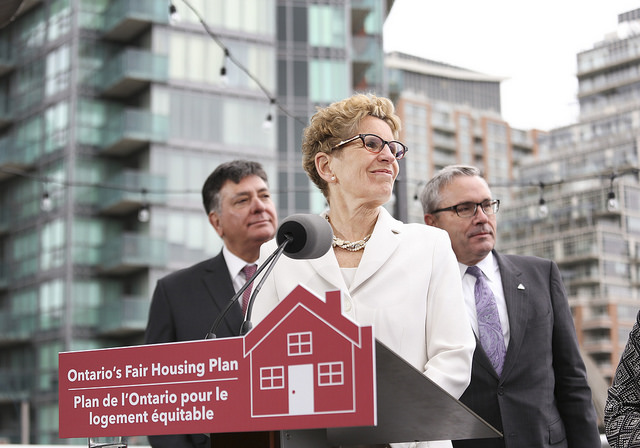
Ontario election one year out, Wynne looks to rebrand, hang onto power
by Allison Jones, The Canadian Press

The Liberal government will have been in power 15 years by next year's election. Facing dismal approval ratings and continued backlash over high electricity prices, the premier has made a noticeable shift to the left

Premier Kathleen Wynne’s language has taken on a different tone in recent big announcements. PHOTO: Premier of Ontario Photography/Flickr
TORONTO—Kathleen Wynne is all about the F word.
Listen to Ontario’s premier speak these days and chances are she’ll talk about fairness. It has become her mantra, an idea she ties to nearly every big announcement she has made lately, from a $15 minimum wage to a basic income pilot to housing market cooling measures and rent control.
Expect that to continue through to next year’s election on June 7, 2018.
“Everything we’ve done will be part of the re-election (bid), but I certainly hope there will be a discussion in the election campaign about how to have a fairer society,” Wynne, 64, said in a recent interview.
Wynne said she is “being very intentional about fairness,” whether it’s by raising the minimum wage, giving low- and middle-income students free post-secondary tuition, a youth pharmacare plan or cutting electricity bills.
Hydro is where the renewed focus on fairness and affordability seems to have started. With voter anger over rising hydro bills reaching a fever pitch, Wynne first admitted at a Liberal convention in November that she made a “mistake” by paying too much attention to the larger problems in the electricity system and not enough to how costs were accumulating on people’s bills.
She has always fought for “social justice,” Wynne said, but what’s changed is how she communicates her plan.
Wynne used the word fair and variations of it about a dozen times while unveiling a basic income pilot project in April and about two dozen times while talking about a $15 minimum wage last month. She has unveiled the Fair Hydro Plan, the Fair Housing Plan and the Fair Workplaces and Better Jobs plan.
“Making sure that we do everything that we can to make people’s lives fairer, make the province a fairer place to live, yeah, that has been a focus,” Wynne said in the interview.
Greg Sorbara, who was finance minister under Wynne’s predecessor Dalton McGuinty, called that platform a game changer.
Sorbara made headlines earlier this year for saying on TVO’s “The Agenda” it was “extremely unlikely” the Liberals could win the next election with Wynne at the helm. Her approval ratings have been dismal of late.
“The night I was on ‘The Agenda’ the prospects looked very dim indeed,” he said in an interview. “I think there’s more light at the end of the tunnel…There’s a sense that the premier herself and the government is really getting its act together and that bodes well in the last year of a mandate.”
There is a renewed focus on vulnerable populations, which is often a political strategy of the left, Sorbara said.
“Is (Wynne) occupying all of the space of Andrea Horwath’s (NDP) party?” he said. “I think she’s occupying a lot of it and I’m not sure that’s a bad political strategy.”
Wynne swears she is still “leading from the activist centre,” her phrase of 2014, but many others have noted her shift to the left. A recent newspaper editorial called her a great NDP premier.
The next election will be the most difficult the Liberals have faced in a long time, Sorbara said.
Anger over hydro bills has not gone away, and opposition politicians will be sure to remind voters that the Liberal plan to cut bills in the short term means ratepayers will end up paying more in the long term. Wynne’s decision to partially sell Hydro One to raise infrastructure cash remains unpopular.
In September, not one but two trials begin involving Liberals. One in Sudbury on Election Act bribery charges and another in Toronto on mischief and breach of trust charges over the alleged deletion of emails about gas plant cancellations.
And by that time, the Liberals will have been in power for 15 years. One of their biggest challenges will be fighting an appetite for change, said Genevieve Tellier, a political science professor at the University of Ottawa.
“It’s to send a message that it’s not the old Liberals that are in power, but they have new ideas and they’re a dynamic and efficient and responsible government and they deserve to be re-elected,” she said.
That messaging was on display this weekend as 600 Liberals did a mass canvass in 54 ridings, knocking on 60,000 doors to promote their plan.
Polls have suggested they have a long way to go, but Wynne’s laser focus on pocketbook issues could still pay off.
One of the latest polls put the Liberals ahead of the Progressive Conservatives, though within the margin of error, and Wynne’s own dismal approval rating saw a slight uptick, though still below 20 per cent.
The Campaign Research poll is an outlier right now, but CEO Eli Yufest said announcements such as youth pharmacare, basic income and a balanced budget have helped the Liberals pull ahead in his polling for the first time in a long time.
“The provincial Liberals will not give up without a fight,” he said. “There’s no doubt that what they’re doing, what they’re unveiling in terms of policy is resonating among the electorate.”